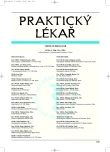-
Medical journals
- Career
Glycaemic index of carbohydrates – relation to obesity.
Authors: Kunešovám. 1; P. Hlavatý 1; Lipkovám. 1; K. Hlavatá 1; P. Kalousková 1; Bajzovám. 2; V. Kunová 1; I. Málková 3; J. Lajka 4; V. Štich 2; V. Hainer 1; M. Wagenknecht 1
Authors‘ workplace: Obezitologické centrum Endokrinologický ústav, Praha Ředitel: doc. MUDr. Vojtěch Hainer, CSc. 1; Oddělení tělovýchovného lékařství 3. LF UK Praha Vedoucí: doc. MUDr. Vladimír Štich, CSc. 2; Společnost „Stop obezitû“ (STOB) Vedoucí: PhDr. Iva Málková 3; STEMMARK a. s., Praha Ředitel: Ing. Jan Tuček 4
Published in: Prakt. Lék. 2007; 87(3): 150-152
Category: Of different specialties
Overview
Dietary composition is one of the factors that is influencing the current epidemic of obesity. Carbohydrate composition and protein content in weight reduction diets have been discussed in recent years. The glycaemic index of carbohydrates is one of the most controversial issues.
The effect of glycaemic index (GI) on weight is explained by a higher serum glucose and insulin response induced by high GI carbohydrates, which promote lower fat oxidation and higher fat storage in comparison with low GI carbohydrates. Therefore foods with a high GI could contribute to the maintenance of excess weight in obese individuals and during weight reducing diets; high GI foods can also predispose obesityprone subjects to weight gain. But in studies using low and high glycaemic index foods equivocal results were shown. In this review, studies comparing the effects of meals with low and high glycaemic index carbohydrates are discussed. The European DIOGenes study (DIet, Obesity and Genes) focuses on the role of glycaemic index and protein proportion in weight management in parents and their children, and should assist in clarifying this issue.Key words:
obesity, glycaemic index, DIOGenes, diet, carbohydrates, proteins.
Labels
General practitioner for children and adolescents General practitioner for adults
Article was published inGeneral Practitioner

2007 Issue 3-
All articles in this issue
- An asymptomatic form of primary hyperparathyroidism – accidental finding.
- Thyroid cancer and malignant lymphoma – is there a relationship?
- Spectral analysis of heart rate variability in persons with mild subclinical hypothyroidism
- Testosterone replacement therapy in aging men.
- Physical activity and obesity.
- The treatment of obesity – Current trends and future perspectives
- Thyroid disease in the GP’s practice
- Glycaemic index of carbohydrates – relation to obesity.
- Health Spa weight management and its influence on anthropometric, psychobehavioural and hormonal indices
- Implication of molecular genetic examination in a three generational family with multiple endocrine neoplasia type 2A
- Diabetes mellitus type 1 (DM 1) and autoimmune thyroiditis as a complication of Interferon alpha treatment.
- The day to day life of Czech diabetic patients: Psychosomatic problems of diabetes.
- Drug-induced gynecomastia
- Autoimmune polyglandular syndrome type 2 in the general practitioner’s surgery.
- ACTH-dependent Cushing’s syndrome due to a carcinoid tumour Cushing’s
- General Practitioner
- Journal archive
- Current issue
- Online only
- About the journal
Most read in this issue- Testosterone replacement therapy in aging men.
- Drug-induced gynecomastia
- ACTH-dependent Cushing’s syndrome due to a carcinoid tumour Cushing’s
- Thyroid cancer and malignant lymphoma – is there a relationship?
Login#ADS_BOTTOM_SCRIPTS#Forgotten passwordEnter the email address that you registered with. We will send you instructions on how to set a new password.
- Career

